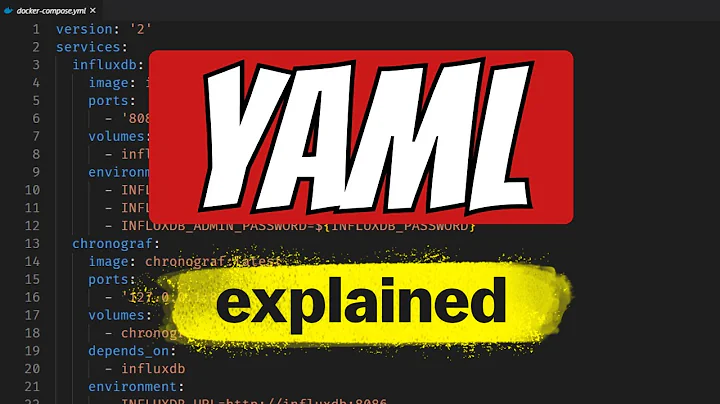Golang nested Yaml values
Solution 1
I had a similar requirement where on a yaml file i was needed to perform nested retrievals. As i found no out of the box solution i had to write it myself.
I have a yaml file having content like below
"a": "Easy!"
"b":
"c": "2"
"d": ["3", "4"]
"e":
"f": {"g":"hi","h":"6"}
I wanted to access and print nested values from this structure and the output should be like below
--- yaml->a: Easy!
--- yaml->b->c: 2
--- yaml->b->x: None //not existing in the yaml
--- yaml->y->w: None //not existing in the yaml
--- yaml->b->d[0]: 3 //accessing value from a list
--- yaml->e->f->g: hi
I also did not want to define a structure to hold the parsed yaml. The most generic structure in golang is interface{}. The most suitable structure to unmarshall the yaml is map[interface{}]interface{}. For folks coming from java this is akin to Map<Object,Object>. Once the data is unmarshalled i had to write a function which can traverse the structure using nested keys and return the value.
Below is the code to do it. Turn on the comments and execute to know how the code traverses nested structure and finally gets the value. Though this example assumes all the values in the yaml are string this can be extended for numerical keys and values as well.
package main
import (
"fmt"
"gopkg.in/yaml.v2"
"io/ioutil"
"reflect"
)
func main() {
testFile := "test.yaml"
testYaml, rerr := ioutil.ReadFile(testFile)
if rerr != nil {
fmt.Errorf("error reading yaml file: %v", rerr)
}
m := make(map[interface{}]interface{})
if uerr := yaml.Unmarshal([]byte(testYaml), &m); uerr != nil {
fmt.Errorf("error parsing yaml file: %v", uerr)
}
fmt.Printf("--- yaml->a: %v\n\n", getValue(m, []string{"a"}, -1)) //single value in a map
fmt.Printf("--- yaml->b->c: %v\n\n", getValue(m, []string{"b", "c"}, -1)) //single value in a nested map
fmt.Printf("--- yaml->b->x: %v\n\n", getValue(m, []string{"b", "x"}, -1)) //value for a non existent nest key
fmt.Printf("--- yaml->y->w: %v\n\n", getValue(m, []string{"y", "w"}, -1)) //value for a non existent nest key
fmt.Printf("--- yaml->b->d[0]: %v\n\n", getValue(m, []string{"b", "d"}, 0))
fmt.Printf("--- yaml->e->f->g: %v\n\n", getValue(m, []string{"e", "f", "g"}, -1))
}
func getValue(obj map[interface{}]interface{}, keys []string, indexOfElementInArray int) string {
//fmt.Printf("--- Root object:\n%v\n\n", obj)
value := "None"
queryObj := obj
for i := range keys {
if queryObj == nil {
break
}
if i == len(keys)-1 {
break
}
key := keys[i]
//fmt.Printf("--- querying for sub object keyed by %v\n", key)
if queryObj[key] != nil {
queryObj = queryObj[key].(map[interface{}]interface{})
//fmt.Printf("--- Sub object keyed by %v :\n%v\n\n", key, queryObj)
} else {
//fmt.Printf("--- No sub object keyed by %v :\n%v\n\n", key)
break
}
}
if queryObj != nil {
lastKey := keys[len(keys)-1]
//fmt.Printf("--- querying for value keyed by %v\n", lastKey)
if queryObj[lastKey] != nil {
objType := reflect.TypeOf(queryObj[lastKey])
//fmt.Printf("Type of value %v\n", objType)
if objType.String() == "[]interface {}" {
//fmt.Printf("Object is a array %v\n", objType)
tempArr := queryObj[lastKey].([]interface{})
//fmt.Printf("Length of array is %v\n", len(tempArr))
if indexOfElementInArray >= 0 && indexOfElementInArray < len(tempArr) {
value = queryObj[lastKey].([]interface{})[indexOfElementInArray].(string)
}
} else {
value = queryObj[lastKey].(string)
}
}
}
return value
}
Solution 2
I think you have an extra level of nesting. The Config struct may not be required. Could you try the following definitions:
type Ecs struct {
Services []Service
}
type Service struct {
Name string
TaskDefinition string
DesiredCount int
}
And then try to unmarshal the yaml data. You can then perhaps access the data as ecs.Services.
Solution 3
You should use struct tags since you name the fields with lower case letters. This applies to different named fields as well.
See the example for how to fix this: https://play.golang.org/p/WMmlQsqYeB the other answer is incorrect.
Related videos on Youtube
smugcloud
Updated on June 20, 2022Comments
-
smugcloud about 2 years
I am trying to access Yaml files and grab individual values, but am struggling with the Struct syntax to achieve this. The code below processes the Yaml and I can print the full Struct, but how can I access the individual
ecs.services.nameattribute?Any recommendations on how to handle this is welcome as I have come across several Yaml libraries but haven't been able to get any of them to fully work.
test.yaml:
ecs: services: - name: my-service taskDefinition: my-task-def desiredCount: 1Yaml.go
package main import ( "fmt" "io/ioutil" "path/filepath" "gopkg.in/yaml.v2" ) type Config struct { //Ecs []map[string]string this works for ecs with name Ecs struct { Services []struct { Name string TaskDefinition string DesiredCount int } } //Services []map[string][]string } func main() { filename, _ := filepath.Abs("test.yaml") yamlFile, err := ioutil.ReadFile(filename) check(err) var config Config err = yaml.Unmarshal(yamlFile, &config) check(err) fmt.Printf("Description: %#v\n", config.Ecs.Services) } func check(e error) { if e != nil { panic(e) } }Output
$ go run yaml.go Description: []struct { Name string; TaskDefinition string; DesiredCount int }{struct { Name string; TaskDefinition string; DesiredCount int }{Name:"my-service", TaskDefinition:"", DesiredCount:0}} -
meh about 5 yearsMy use case was go templates. Unmarshalling yaml into
map[interface{}]interface{}is working so far (I've been using it for a full 30 seconds).







